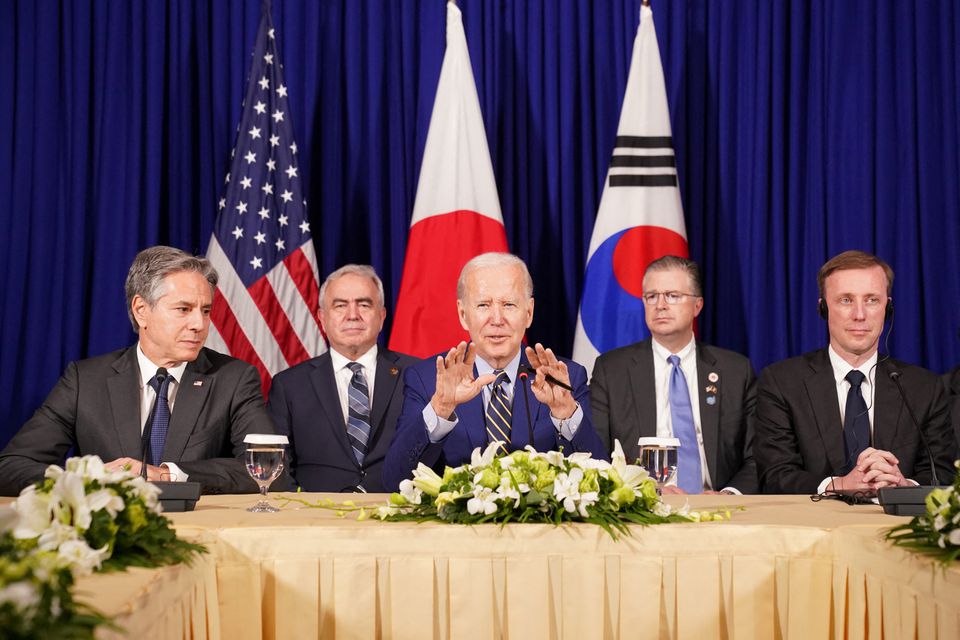PHNOM PENH, (Reuters) – U.S. President Joe Biden told Asian leaders today that U.S. communication lines with China would stay open to prevent conflict, as the first of three summits of world leaders this week ended, with tense talks almost certain in the days ahead.
Biden during an address to the East Asia Summit in Cambodia, said the United States would “compete vigorously” with Beijing while “ensuring competition does not veer into conflict”, stressing the importance of peace in the Taiwan Strait.
Biden also called on Myanmar’s military rulers to follow a peace plan they agreed to with the Association of Southeast Asian Nations (ASEAN), while condemning North Korea’s missile launches and Russia’s “brutal and unjust” invasion of Ukraine.
The Southeast Asia region is also hosting the Group of 20 (G20) Summit in Indonesia’s Bali this week, ahead of which Biden will meet Chinese counterpart Xi Jinping for the first time since taking office, with relations between the two superpowers at their worst in decades.
The war in Ukraine and its economic fallout is expected to dominate discussions in Bali and at the Asia-Pacific Economic Cooperation (APEC) forum in Bangkok at the end of the week, as alongside climate commitments, food insecurity and tensions over the Taiwan Strait, the South China Sea and North Korea.
Russian Foreign Minister Sergei Lavrov on the sidelines of the summit in Cambodia on Sunday accused the West of militarising Southeast Asia to contain Chinese and Russian interest in a key geostrategic battleground.
“The United States and its NATO allies are trying to master this space,” Lavrov told reporters.
He said Biden’s Indo-Pacific strategy, which the U.S. president was promoting heavily at the meeting, was an attempt to bypass “inclusive structures” for regional cooperation.
Lavrov is representing President Vladimir Putin at the summits and is expected to hear stinging rebukes from within the G20 over the invasion of Ukraine, which Moscow calls a special military operation.
Though Ukraine is not a G20 member, its president, Volodymyr Zelenskiy, will address the meeting virtually.
Russia’s foreign ministry on Sunday said the G20 was not the forum to handle security issues and should instead focus on pressing global economic challenges. Lavrov arrived in Bali from Cambodia on Sunday evening.
“Expanding its agenda into areas of peace and security, which many countries are talking about, is not viable,” it said of the G20 forum.
Eighteen countries accounting for half the global economy attended Sunday’s East Asia Summit, which was held behind closed doors, attended by the ASEAN nations, Japan, South Korea, China, India, the United States, Russia, Australia and New Zealand.
The summit’s chair, Cambodian Prime Minister Hun Sen, said the plenary meeting handled some heated discussion, but the atmosphere was not tense.
“Leaders talked in mature way, no one left,” he told a news conference.
Biden held a trilateral meeting with leaders of allies Japan and South Korea and said the three countries were “more aligned than ever” on North Korea.
South Korea President Yoon Suk-yeol said the North’s recent provocations showed its regime’s “nature against humanitarianism”, adding it had become more hostile and aggressive based on confidence in its nuclear and missile capabilities.
Japan counterpart Fumio Kishida said Pyongyang’s actions, which included a recent firing of a ballistic missile over Japan, were unprecedented.
“This trilateral summit is timely given we are expecting further provocation,” Kishida said.
Kishida also took a swipe at China for what he called violations of Japan’s sovereignty in the East China Sea and said Beijing was responsible also for heightening regional tension in the South China Sea, a conduit for at least $3 trillion in annual trade.
At a separate news conference, Australian Prime Minister Anthony Albanese said his brief discussions the previous day with Chinese Premier Li Keqiang were constructive and positive, amid anticipation of a formal summit with Xi.
Like ally the United States, Australia’s ties with China have also deteriorated in recent years.
“I have said repeatedly about the relationship with China that we should cooperate where we can,” Albanese said. “And that dialogue is always a good thing.”






